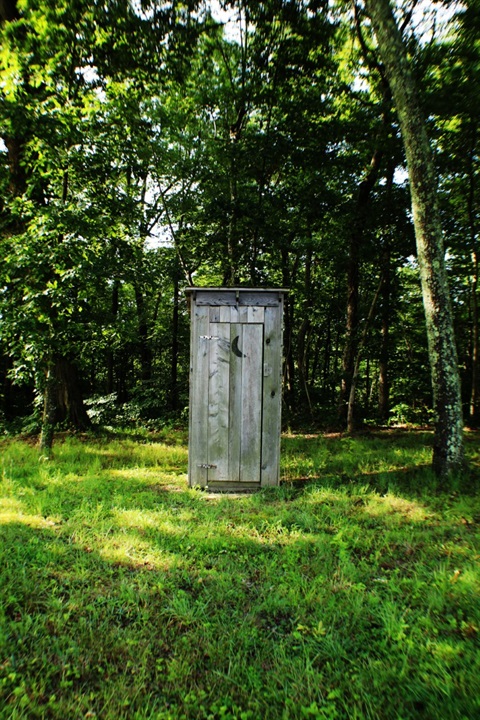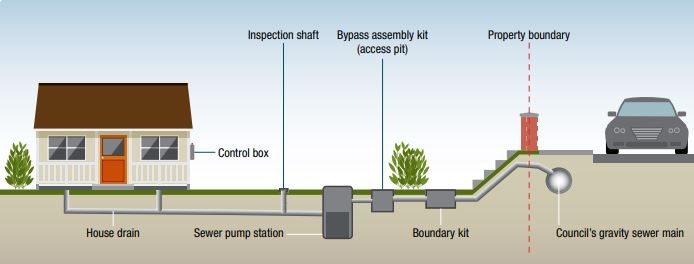On-site sewage management (septic)

All on-site sewage management systems require approval to operate.
What is an on-site sewage management system?
Systems that are not connected to the Council sewage system
On-site sewage management systems (which include septic tank systems, aerated waste treatment systems, composting systems, greywater irrigation systems, etc.) are required in all areas where sewer is not available.
These systems treat waste water generated from a home or business. The end product, which is referred to as effluent, is then gravity-fed or pumped to a land application area (effluent disposal area) which could be surface or subsurface absorption or irrigation systems or in some cases a system whereby a holding well is utilised and later collected by tanker.
Ejection Pump Stations that are connected to the Council sewage system
In the Tweed, some sewage ejection pump stations are owned by the property owner and others are owned by Council. If Council owns the station, it maintains the station (Council owned stations are mainly located in Burringbar/ Mooball, Azura, Dobby`s Crescent and Smiths Creek Road Uki).
If the station is privately owned, it is called a private sewage ejection pump station. It is the responsibility of the owner to engage a licensed plumber to service and repair the private station if and when required.
If you would like to check with an officer about whether your pump station is privately owned, please call 02 6670 2400 and ask for an on-site sewage officer.
Pump stations are situated below ground, with only the lid and inspection shaft showing above ground. The station comprises a small holding tank and a pump, which is powered by the property’s domestic power supply. The pump station has a control box, normally located near your electricity meter box. The control box has an alarm (to alert you to a problem) and a mute button (to silence the alarm).
Sewage ejection pump station user guide(PDF, 151KB)
Application for a sewage ejection pump station(PDF, 190KB)

What is sewage?
Sewage is a combination of both blackwater and greywater, and again is very infectious. Special rules apply to sewage treatment and disposal.
What is greywater?
Greywater is household wastewater from baths, basins, showers, laundries and kitchens. Kitchen wastewater is not recommended for reuse because it contains large amounts of grease, fat, food waste and detergent. Greywater will become contaminated pathogens within 24 hours and can be very infectious. Greywater must not be handled and must be properly treated before reuse. Special rules apply for the reuse of greywater.
What is the difference between greywater and blackwater?
Blackwater is wastewater generated from a toilet, bidette or bidet which is heavily and directly contaminated with human faeces and/or urine and may contain contaminated solid material, such as toilet paper. Blackwater is highly infectious. All blackwater must be treated prior to disposal. Special rules apply to blackwater treatment and disposal.
Approval to operate an on-site sewage management system
You must have Council approval for all on-site sewage management systems.
Operating a system of sewage management is a prescribed activity under section 68 of the Local Government Act 1993 and clause 45 of the Local Government (General) Regulation 2005.
Unlike Council consent for the development of land, Council approval to operate a system of sewage management is personal and does not run with the land.
Approval to operate a system of sewage management is primarily an accountability mechanism between the individual landowner and the council. Unlike other approvals under the Local Government Act 1993, which relate to a specific time frame, this is an 'operating approval' setting performance objectives and accountability requirements for the management of an ongoing activity.
Approval to operate a system of sewage management requires the landowner to take all reasonable steps to minimise transmission of disease, pollution of water and degradation of land as a result of sewage management activity and requires that the landowner inform the council about those activities and pay fees to contribute to the council's costs of managing the cumulative impact of sewage pollution.
The nature of the particular sewage management facilities in use is a relevant matter for consideration. However, it is the activity of sewage management, not the facilities, which are the subject of the approval. The design and construction of sewage management facilities and land application areas is properly regulated by the requirement to obtain either development consent under the Environmental Planning and Assessment Act 1979 or activity approval under the Local Government Act 1993. Facility upgrading requirements are properly dealt with by an Order under s.124 of the Local Government Act 1993 (eg. order number 22).
Application for Approval to Operate a Septic System
Who has to apply for approval to operate?
All landowners with any type of on-site sewage system on their property need to seek approval from Council to operate their system. A property owner must lodge an application for approval to operate within 60 days of ownership. The Approval of Plumbing and Drainage Work - Private Property is available from Council or the website and an application fee is payable at the time of lodgement. Once you have applied, Council will contact you to arrange an inspection of your system (if required).
Is making an application for approval to operate compulsory? Yes.
Yes. Making an application for approval to operate is compulsory if you have an on-site sewage management system. This helps council to keep accurate records and allow you to continue to operate the system until an approval to operate is issued.
I have recently purchased a property with a wastewater treatment system, what do I have to do?
If you have recently purchased a property that is not connected to the sewer system and has some sort of on-site sewage system you must lodge an application for approval to operate within 60 days of ownership. The application form is available from council or on councils the website and an application fee is payable at the time of lodgement. Once you have applied council will contact you to arrange an inspection of your system (if required).
My on-site sewage system is relatively new and was approved by council when the house was built. Do I need to apply for approval to operate my system?
Yes. Although your system may have been given approval to be installed as part of a building approval you are required by law to apply for approval to operate. The on-going maintenance and management of your sewage management facility is critical to keep systems functioning properly. The application form is available from council or the councils website and an application fee is payable at the time of lodgement. Once you have applied council will contact you to arrange an inspection of your system (if required).
I live in a dwelling that was built without Council approval. Should I apply for approval to operate my on-site sewage system?
Yes. However council will require you to provide information to assist with the application and to undertake certain actions to rectify the situation. The type of information and action may vary and will usually be different in each situation. You will probably have to seek and obtain development consent for the use of the illegal development and seek and obtain a Building Information Certificate for all illegal buildings.
Illegal dwellings and other structures have the potential to present a risk to safety, the environment and community amenity. During inspections it is likely that dwellings or other structures erected without Council approval will be identified.
What happens after council has inspected my on-site sewage system?
Council will provide you with a written report about the inspection findings. The report may include an approval to operate that requires you to undertake maintenance, repairs or other actions to rectify any matters described.
If the system is not functioning, in a state of disrepair or causing public health or environmental risks you may be subject to other legal action including orders or fines. These are generally only issued in extreme circumstances or where the owner is refusing to attend to the matters identified.
Will I get fined if my sewage system is found to be performing poorly?
If there is no significant and/or wilful pollution occurring and the system is registered for approval to operate with Council, legal action will only be taken if you refuse to repair or replace the system that is functioning inadequately.
It is important your sewage system is safe and does not cause disease and water pollution.
How do I apply to install a new on-site sewage system or upgrade my existing system?
Council has instructional guides to help you through the process of installation or replacement. These are available on request.
Why do some on-site sewage treatment systems have to be serviced by an authorised service agent and also be inspected by council?
Some systems such as aerated treatment systems and some biological filters require specialised servicing to work properly. NSW law requires that those systems must receive regular maintenance. The service requirements are set out in the certificate of accreditation issued by NSW Health.
Authorised Service agents who are properly qualified and suitably experienced attend to the mechanical functions of the treatment and disposal system and ensure components are properly maintained and serviced.
Without proper servicing most system components breakdown resulting in system failure and expensive rectification work. Council inspections are done to ensure compliance with laws and regulations.
What if an owner mistakenly provides incorrect information to Council when applying?
It is a requirement of the Local Government Act that when making an application any information requested by Council must be supplied. If the information supplied is insufficient to determine the application Council may require additional information to be submitted.
If a person knowingly supplies false or misleading information they are guilty of an offence and may be fined up to $2,200. If Council determines that a person has made a genuine error no action will be taken.
Fees and charges
Council levies an annual service fee for properties serviced by an on-site sewage system. The fees fund the monitoring and inspection program.
I am considering purchasing a property with an on-site sewage system, does council do pre-purchase reports for on-site sewage?
Yes. A pre-purchase inspection is recommended and should be a condition of sale.
You can apply to council for a Pre-purchase on-site sewage system report. The application form is available from council or the councils website and an application fee is payable at the time of lodgement. The report is generally completed within ten working days from the date of the application.
Also see NSW Health department